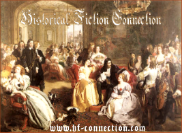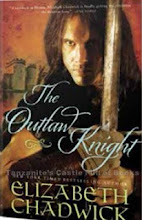I can't let the anniversary of the death of my favorite monarch go by without a post. This is copied from my post on the anniversary last year.
Richard III (Oct 2, 1452 - Aug 22, 1485)
On this day in 1485, the most maligned King in English history was killed at the Battle of Bosworth field. He was betrayed by some of his lords and was "piteously slain and murdered" (as is recorded in the York City records), paving the way for the usurper Henry Tudor, Earl of Richmond (Henry VII). Thus began the Tudor Dynasty, based on a very weak and illegitimate claim to the throne, and the complete destruction of Richard's reputation.
The battle was mainly a hand-to-hand encounter (which was typical of the times), with the Stanley family (who had promised Tudor that they would desert Richard) keeping away from the fight until, at a critical moment when it was obvious which way the victory was headed, they joined Tudor. Richard, realizing that he was betrayed, cried out, "Treason, treason!" He knew he'd either leave as the King of England or dead and refused to leave the field until, overpowered by numbers, he fell dead in the middle of his enemies. He came very close to dispatching his enemy,
 Henry
Tudor, killing his standard barer, William Brandon (the father of
Henry VIII's close friend, Charles Brandon). Even his enemies had to
admit that he fought with courage (Tudor's historian even wrote that "King Richard, alone, was killed fighting manfully in the thickest press of his enemies").
The crown was supposedly
picked up on the field of battle and placed by Sir William Stanley on
the head of Tudor, who was at once proclaimed king by the whole army.
After the battle Richard's body was taken to Leicester, carried naked
across a horse's back, and buried without honor in the church of the
Greyfriars. His death was the end of the Plantagenet Dynasty which had
ruled England since the succession of Henry II in 1154. In a twist which
can tell us a lot about the man who benefited from Richard's death,
Tudor dated his reign from the day BEFORE the battle so he could charge
all the men who had fought for an anointed and crowned king with
treason.
Henry
Tudor, killing his standard barer, William Brandon (the father of
Henry VIII's close friend, Charles Brandon). Even his enemies had to
admit that he fought with courage (Tudor's historian even wrote that "King Richard, alone, was killed fighting manfully in the thickest press of his enemies").
The crown was supposedly
picked up on the field of battle and placed by Sir William Stanley on
the head of Tudor, who was at once proclaimed king by the whole army.
After the battle Richard's body was taken to Leicester, carried naked
across a horse's back, and buried without honor in the church of the
Greyfriars. His death was the end of the Plantagenet Dynasty which had
ruled England since the succession of Henry II in 1154. In a twist which
can tell us a lot about the man who benefited from Richard's death,
Tudor dated his reign from the day BEFORE the battle so he could charge
all the men who had fought for an anointed and crowned king with
treason.
Richard most likely was not the
villain that his enemies made him out to appear. He had good qualities (and bad qualities),
both as a man and a ruler, and seemed to have a sound judgment of
political needs (he had been able to keep the North of England in peace
for his brother). In testament to those ideas, a historian of the time, John Rous said he was a "good lord" and had a "great heart"
(though he changed his tune once Tudor was on the throne). And the city
of York, after hearing of Richard's defeat at Bosworth, risked the fury
of the new monarch by entering into it's city council records "king Richard late mercifully reigning upon us ... was piteously slane murdred to the grete hevynesse of this citie."
However, it is impossible to convict or clear him of the deaths of his
nephews, Edward V and Richard, Duke of York, in the
Tower of London. He was not a monster but a typical man in an age of
strange contradictions of character, an age of refined (for the day)
culture mixed with horrible cruelty, and he possessed an emotional
temper that was capable of anything (he was a Plantagenet after all).
After his defeat at Bosworth, Tudor and his supporters needed
to solidify his claim to the throne and what better way to do that than
to make the English people think that the King he replaced was a
deformed, evil monster who killed his own nephews? No one did more to
cement that belief than William Shakespeare with his play Richard III
(Undoubtedly writing to please the Tudors but getting HIS information
from Thomas Moore who was only 5 when the events actually occurred;
Moore's information came from Bishop Morton, who hated Richard.). They
were hugely
successful in their endeavors and, unfortunately, this view of Richard
stuck until probably the 20th century when scholars really began to
study him.
Tradition represents Richard as a hunchback but there were no
contemporary accounts of him being "deformed." The discovery of
Richard's skeleton under the car park in Leicester proved that he was
NOT a hunchback (like Shakespeare made everyone believe) but
had scoliosis, which made his fighting ability that much more amazing as he was probably in quite a lot of pain. The discovery also showed that he had multiple wounds all over his body (including one on his "backside") that shows that his body was not treated with any dignity. While the discovery of his body can't confirm or deny the story that he murdered his nephews, it certainly shows that not everything that has been handed down through history is exactly accurate. If Shakespeare's hunchbacked Richard wasn't true, what else may not be true? Many have popped up in the last few months questioning the dig and discovery by the University of Leicester, saying, among other things, that the entire dig was a hoax and this isn't Richard's body. I for one believe that it IS the last York King of England and am looking forward to his reburial in Leicester Cathedral next year.
had scoliosis, which made his fighting ability that much more amazing as he was probably in quite a lot of pain. The discovery also showed that he had multiple wounds all over his body (including one on his "backside") that shows that his body was not treated with any dignity. While the discovery of his body can't confirm or deny the story that he murdered his nephews, it certainly shows that not everything that has been handed down through history is exactly accurate. If Shakespeare's hunchbacked Richard wasn't true, what else may not be true? Many have popped up in the last few months questioning the dig and discovery by the University of Leicester, saying, among other things, that the entire dig was a hoax and this isn't Richard's body. I for one believe that it IS the last York King of England and am looking forward to his reburial in Leicester Cathedral next year.
Loyaulte me lie









































